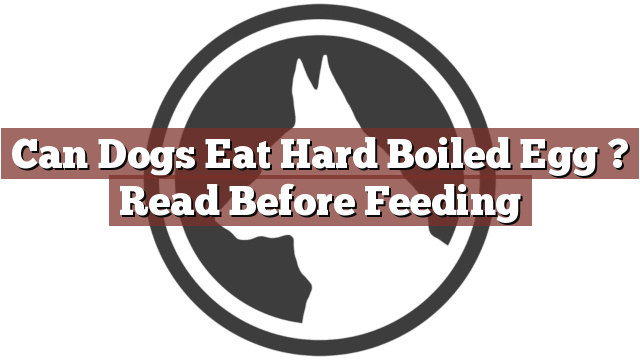Understanding Your Dog’s Dietary Needs
When it comes to our furry friends, understanding their dietary needs is crucial. As responsible pet owners, we must ensure that we provide them with a balanced and nutritious diet. While it’s tempting to share our own food with them, it’s important to remember that not all human foods are safe for dogs. Can a dog eat hard-boiled eggs? Let’s delve into this topic and find out.
Can Dogs Eat Hard Boiled Egg? Read Before Feeding
Can dogs eat hard-boiled eggs? The answer is yes. Hard-boiled eggs can be a healthy addition to your dog’s diet. Eggs are packed with essential nutrients such as protein, vitamins, and minerals that can contribute to their overall well-being. However, it’s crucial to remember that moderation is key. Too much of a good thing can be harmful, especially when it comes to dietary changes for our furry friends.
Pros and Cons of Feeding Hard Boiled Eggs to Dogs
Feeding hard-boiled eggs to dogs comes with its own set of pros and cons. Let’s take a closer look at both sides:
Pros:
-
Nutritional benefits: Hard-boiled eggs are an excellent source of high-quality protein, which is essential for muscle development, growth, and repair. They also contain vitamins A, D, and E, as well as minerals like iron and selenium, which contribute to the overall health of dogs.
-
Easy to digest: Hard-boiled eggs are easily digestible, making them suitable for dogs with sensitive stomachs or those recovering from an illness.
Cons:
-
Allergies: Just like humans, dogs can also develop allergies or sensitivities to certain foods, including eggs. If you notice any signs of an allergic reaction such as itching, vomiting, or diarrhea after feeding your dog hard-boiled eggs, it’s best to consult your veterinarian.
-
Cholesterol concerns: While dogs can handle a certain amount of dietary cholesterol, excessive consumption can lead to health issues, especially for dogs prone to obesity or cardiovascular problems. Therefore, it’s important to feed hard-boiled eggs in moderation and as part of a balanced diet.
Conclusion: Considerations for Feeding Hard Boiled Eggs to Dogs
In conclusion, hard-boiled eggs can be a nutritious addition to your dog’s diet, but it’s important to consider a few factors. Can your dog eat hard-boiled eggs? Yes, but it’s crucial to introduce them gradually and monitor for any adverse reactions. Always consult your veterinarian before making any significant changes to your dog’s diet, especially if they have pre-existing health conditions. Remember, a balanced and varied diet, along with regular exercise, is key to keeping your furry friend happy and healthy.
Thank you for taking the time to read through our exploration of [page_title]. As every dog lover knows, our furry friends have unique dietary needs and responses, often varying from one canine to another. This is why it's paramount to approach any changes in their diet with caution and knowledge.
Before introducing any new treats or making alterations to your dog's diet based on our insights, it's crucial to consult with a veterinarian about [page_title]. Their expertise ensures that the choices you make are well-suited to your particular pet's health and well-being.
Even seemingly harmless foods can sometimes lead to allergic reactions or digestive issues, which is why monitoring your dog after introducing any new food item is essential.
The content provided here on [page_title] is crafted with care, thorough research, and a genuine love for dogs. Nevertheless, it serves as a general guideline and should not be considered a substitute for professional veterinary advice.
Always prioritize the expert insights of your veterinarian, and remember that the health and happiness of your furry companion come first.
May your journey with your pet continue to be filled with joy, love, and safe culinary adventures. Happy reading, and even happier snacking for your canine friend!

